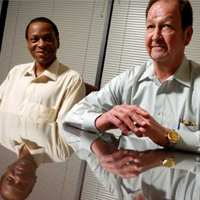Marriage News Blog

Today marks the ninth anniversary of a watershed moment in American constitutional history, one which set the stage for our effort to secure the freedom to marry for every American.
On June 26, 2003, the United States Supreme Court decided Lawrence v. Texas.┬Ā The case involved two men, John Geddes Lawrence and Tyron Garner, who were arrested in LawrenceŌĆÖs home and convicted under TexasŌĆÖ ŌĆ£Homosexual ConductŌĆØ law.┬Ā (The story behind the Lawrence case is told in Professor Dale CarpenterŌĆÖs new book, Flagrant Conduct.)
Justice Anthony M. Kennedy wrote for the Court:
“When sexuality finds overt expression in intimate conduct with another person, the conduct can be but one element of a personal bond that is more enduring.┬Ā The liberty protected by the Constitution allows homosexual persons the right to make this choice.”
Lawrence is the fourteenthŌĆöand most recentŌĆöcase in which the Supreme Court has stated that marriage is a fundamental right of all individuals. ┬ĀIn Lawrence, the Court recognized that
ŌĆ£persons in a homosexual relationshipŌĆØ enjoy ŌĆ£constitutional protection [for] personal decisions related to marriage,ŌĆØ ŌĆ£just as heterosexual persons do.ŌĆØ
At the heart of Lawrence is an understanding that the ConstitutionŌĆÖs central protections of liberty, equality, and human dignity are guaranteed to all Americans.
In light of this truth, it is only logical to ask, ŌĆ£What justification could there possibly be for denying the benefits of marriage to homosexual couples exercising ŌĆśthe liberty protected by the ConstitutionŌĆÖ?ŌĆØ┬Ā These words belong to Justice Antonin Scalia, who dissented in the Lawrence case.
In AFERŌĆÖs case against Prop. 8, the Federal District Court and the Ninth Circuit Court of Appeals have each addressed Justice ScaliaŌĆÖs question.┬Ā Both have responded with the same answer: There is no justification for denying gay and lesbian Americans right to marry.┬Ā As the Ninth Circuit held:
“Proposition 8 serves no purpose, and has no effect, other than to lessen the status and human dignity of gays and lesbians in California.”
Three weeks ago, the Ninth Circuit declined to reconsider its landmark decision invalidating Prop. 8, paving the way for the Supreme Court to hear our case.┬Ā As we enter the final chapter of our fight against marriage inequality, AFER is mindful that our ConstitutionŌĆÖs promise of liberty is one that every generation must realize.┬Ā As Justice Kennedy said in Lawrence:
“Had those who drew and ratified the Due Process Clauses of the Fifth Amendment or the Fourteenth Amendment known the components of liberty in its manifold possibilities, they might have been more specific. ┬ĀThey did not presume to have this insight. ┬ĀThey knew times can blind us to certain truths and later generations can see that laws once thought necessary and proper in fact serve only to oppress.┬Ā As the Constitution endures, persons in every generation can invoke its principles in their own search for greater freedom.”
Photo: John Geddes Lawrence, right, and Tyron Garner. ┬ĀChristobal Perez, Houston Chronicle.
